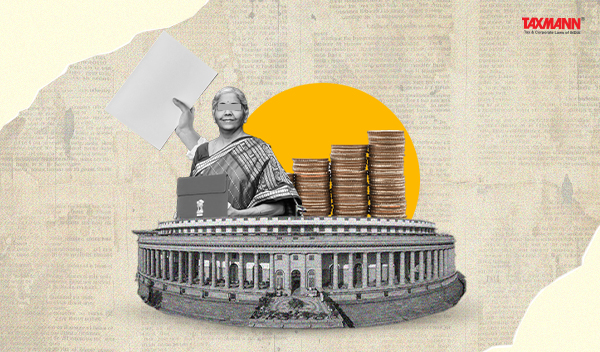Changes Proposed in the Finance (No. 2) Bill as Passed by the Lok Sabha
- Blog|News|Income Tax|
- 3 Min Read
- By Taxmann
- |
- Last Updated on 9 August, 2024

On August 7, 2024, the Lok Sabha passed the Finance (No. 2) Bill, 2024, which included over 30 amendments to the original bill introduced on July 23, 2024. While most amendments are consequential, two significant changes have been made, which are as follows:
1. Grandfathering of long-term capital gain from land or building in case of resident individual/HUF
In light of the removal of the indexation benefit for long-term capital gains and the introduction of a uniform tax rate of 12.5% on long-term capital gains, a grandfathering provision is proposed to be introduced under section 112 by the Finance (No. 2) Bill 2024 as passed by the Lok Sabha.
This grandfathering provision has the following implications:
- It applies only to resident individuals and resident Hindu Undivided Families (HUFs). A non-resident person, company, partnership firm or any other assessee is not eligible for this benefit.
- It applies only to the transfer of a long-term capital asset, being land or building or both. This provision does not cover other long-term capital assets, such as gold or bullion.
- The land or building must have been acquired on or before 22-07-2024 to qualify for the grandfathering benefit.
- The provision is applicable if the tax on long-term capital gains from the transfer of such land or building computed under the new law (i.e., law proposed by the Finance (No. 2) Bill, 2024) exceeds the tax computed under the old law (i.e., the law as it stood immediately before the amendment proposed by the Finance (No. 2) Bill, 2024).
- If the amount of tax under the new law exceeds the amount of tax under the old law, the excess amount shall be ignored.
2. The proviso to Section 192(2B) is substituted to allow the benefit of TDS/TCS while computing TDS on salary income
The Finance (No. 2) Bill 2024, as introduced in the Lok Sabha, substituted sub-section 192(2B) to allow the benefit of all other TDS/TCS while computing tax deductible from salary income.
The proviso inserted in Section 192(2B) provides that the tax-deductible from salary income cannot be reduced due to the inclusion of other income and the tax deducted/collected under the Act. However, the tax-deductible can be reduced due to the loss under the head “Income from house property” which is adjusted against salary income. The proviso is nearly identical to what existed before the amendment.
The effect of this proviso is that the employer, when calculating TDS from salary, must ensure that the tax-deductible from salary income is not reduced below the amount that would have been deducted if other incomes (except loss from house property) and all TDS/TCS were not considered.
This proviso would not provide any logical benefit to salaried employees as certain TDS/TCS do not have any corresponding taxable income, like Section 194N, TCS on LRS or Motor car, etc. If these TDS/TCS are considered, it will reduce the tax to be deducted under Section 192.
Thus, even after amending section 192(2B), the employee will not get benefit of all other tax deducted and collected under the Act.
To remove this ambiguity, the Finance (No. 2) Bill, 2024 as passed by the Lok Sabha has substituted the Proviso to section 192(2B) to provide that the tax-deductible from salary income cannot be reduced except in cases where a loss from “income from house property” and the tax deducted or collected under the Act have been taken into consideration while computing the TDS on salary.
In other words, the tax-deductible from salary income can be reduced if only the following items are taken into consideration:
- Loss from “income from house property; and
- Tax deducted or collected under the Act.
Download Copy of the Finance (No. 2) Bill 2024 as passed by the Lok Sabha
Disclaimer: The content/information published on the website is only for general information of the user and shall not be construed as legal advice. While the Taxmann has exercised reasonable efforts to ensure the veracity of information/content published, Taxmann shall be under no liability in any manner whatsoever for incorrect information, if any.

Taxmann Publications has a dedicated in-house Research & Editorial Team. This team consists of a team of Chartered Accountants, Company Secretaries, and Lawyers. This team works under the guidance and supervision of editor-in-chief Mr Rakesh Bhargava.
The Research and Editorial Team is responsible for developing reliable and accurate content for the readers. The team follows the six-sigma approach to achieve the benchmark of zero error in its publications and research platforms. The team ensures that the following publication guidelines are thoroughly followed while developing the content:
- The statutory material is obtained only from the authorized and reliable sources
- All the latest developments in the judicial and legislative fields are covered
- Prepare the analytical write-ups on current, controversial, and important issues to help the readers to understand the concept and its implications
- Every content published by Taxmann is complete, accurate and lucid
- All evidence-based statements are supported with proper reference to Section, Circular No., Notification No. or citations
- The golden rules of grammar, style and consistency are thoroughly followed
- Font and size that’s easy to read and remain consistent across all imprint and digital publications are applied



 CA | CS | CMA
CA | CS | CMA
